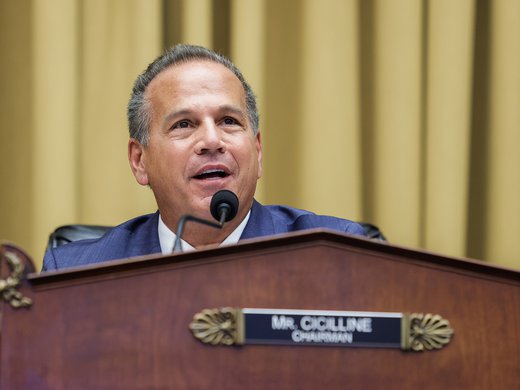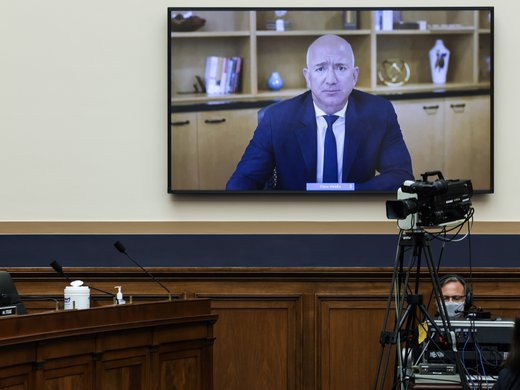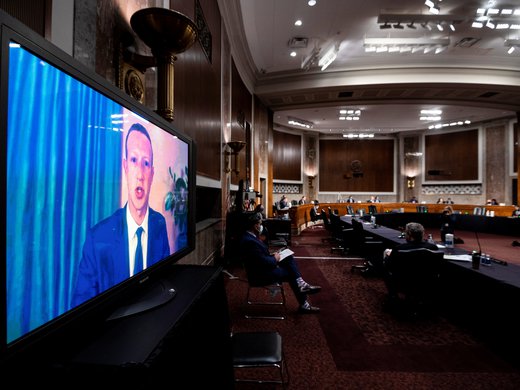The backlash against US technology giants has been building over the past few years. But in 2020, with millions of people dependent on tech as they worked, studied and socialized online during the COVID-19 pandemic, the problems with these giants have zoomed into sharper focus. Recent regulatory actions and lawsuits against “big tech” are setting up 2021 to be the year of antitrust.
Antitrust enforcement tends to move slowly, and while it’s unlikely that the current actions will be resolved in the coming year, it’s clear the public debate about and attention to antitrust issues will be unprecedented.
This intensified focus partly reflects a growing understanding among law makers about not only the companies and technology in question, but also the possible antitrust measures that can be taken in response. However, it also represents a shift in public opinion about powerful digital platforms — increasingly, people are calling for action.
In this context, antitrust is not an end, but part of a larger process in which democratic societies wrestle with how to tame the digital giants while also retaining the benefits and functions they provide. The opportunity that antitrust offers is more than just a healthy public policy debate — it’s a reimagining of regulatory power and responsibility, and of the relationship between technology and society.
As Matt Stoller, author of Goliath: The 100-Year War Between Monopoly Power and Democracy, argued recently, “What Mark Zuckerberg did at Facebook is engage in systemic criminal behavior, and he was able to do so because law enforcers refused to enforce the law against the powerful. That era is over.
If that era is indeed over, it is in no small part due to Lina Khan, and her 2017 paper “Amazon’s Antitrust Paradox.” Khan helped shed light on how existing US antitrust interpretations fell short by focusing almost exclusively on consumer harms related to service price. When a platform’s services are free, such interpretations don’t amount to much.
However, the concept of democratic harms seems far more self-evident and straightforward, as the impact that these companies are having on democracy is now widely discussed and debated.
In 2019, Dina Srinivasan argued in a paper titled “The Antitrust Case Against Facebook” that consumer harms and democratic harms are not mutually exclusive. In the paper, Srinivasan notes that Facebook initially beat out competitor Myspace by offering stronger privacy controls, but once Facebook became dominant, it actively eroded the privacy provided to users. This is an example where consumer harm and democratic harm are effectively the same.
As Gilad Edelman at Wired describes it, the “smoking gun” that proves the linkages Srinivasan hypothesized can be found in the emails exchanged by Facebook executives, which are included in the antitrust suits filed against the company. These internal messages depict a company that was willing to do anything to obtain and maintain their dominant position. In particular, the language used around potential purchases depicted a corporate strategy of innovation through acquisition. Why compete when you can just buy your competition?
Reacting to these cases, Sally Hubbard, author of Monopolies Suck: 7 Ways Big Companies Rule Your Life and How to Take Back Control, commented that “the states’ complaint nails the crux of it all with this one statement — Facebook’s tactics ‘sought to extinguish or impede, rather than outperform or out-innovate, any competitive threat that might challenge Facebook’s dominance.’”
The narrative surrounding the digital platforms has shifted from celebrating disruption to emphasizing the need for regulatory action and public policy. The role of antitrust is now in the spotlight.
Which cases are in motion?
The United States versus Facebook
The most recent antitrust lawsuits focused on digital platforms are against Facebook, one from the Federal Trade Commission (FTC) and another from 46 US states (and 2 US territories). These are considered to be the strongest cases brought against the company so far. They call for Facebook to be broken up by selling Instagram and WhatsApp. Future substantive purchases would require regulatory approval.
Facebook is arguing that these mergers did receive regulatory approval, at the time of the purchases, and that such moves are part of their constant innovation for the users and clients. The company asks, essentially, what has changed since these mergers were approved; the obvious answer is that our understanding of Facebook’s impact has changed.
Meanwhile, Facebook has also been rushing to integrate these services so that they cannot be split; interestingly, as Khan observes, when Facebook was applying for the merger’s approval, it promised it would not combine the data sets.
The United States versus Google
The US Department of Justice has sued Google for antitrust violations over their use of exclusionary agreements that set their search engine as the default on a wide range of devices and systems. This suit followed a high-profile investigation, overseen directly by Attorney General William Barr, and has been subject to criticism that it was rushed and filed prematurely, and is weak as a result.
However, there’s hope that a second antitrust case from US states will be stronger. Led by Texas it argues that Google conspired with Facebook to monopolize online advertising. Additionally, a third lawsuit from 30 other US states charges that the search engine downplayed websites that offered competing specialized search engines.
The United States versus Apple
No formal legal action is underway, but there are concerns over the App Store and the 30 percent cut that Apple takes on all app purchases. These concerns could lead to antitrust action and will be a key development to watch for in 2021.
The European Union versus Amazon
While the United States has not yet taken antitrust action against Amazon, the European Union has, accusing the giant of using data to gain an unfair advantage over merchants using the platform. This may result in significant fines, but could also result in increased transparency, as Amazon could be forced to share data about market activity, that when exclusive, gives them a privileged view of the marketplace.
The European Union versus Facebook
There is currently antitrust action in Germany that is seeking to prevent Facebook from bundling users’ information from Facebook with information gathered from external sources.
Action by the United Kingdom
The United Kingdom is no longer part of the European Union and has moved quickly to create a new Digital Markets Unit within the Competition and Markets authority that may also receive new powers to keep the tech giants in check.
What kind of antitrust actions are being proposed? Company break-up is the big one, and the focus of the recent suits brought against Facebook. However, breaking up these companies would not be easy, and would not necessarily enable a more competitive landscape.
Daniel Munro, a senior fellow at the Munk School of Global Affairs and Public Policy, argues that the opportunity presented by antitrust should not focus on breaking up these companies, but rather on regulating them in the public interest. Patrick Leblond, a CIGI senior fellow, also argues that instead of breakups, or even in addition to them, we should look at open data remedies.
Reached via email, Leblond replied: “Given that data and network effects are at the core of the digital giants’ dominant position, competition authorities and other regulatory bodies operating in the digital space need to address the source of their economic power; otherwise, their actions might only lead to limited results.”
This open data approach could apply to the European Union’s action against Amazon. For example, Amazon could make their data accessible to other vendors on the platform, if not the public at large, so that market activity and trends could be scrutinized by other companies and researchers.
Another option is a data commons. Rather than breaking up digital platform companies, regulators could treat them as public utilities, and recognize that the data that provides them with value is public data, and should be held in trust or recognized as public infrastructure.
The question of responsibility for big tech regulation is still on the table. Is the FTC or the Canadian Competition Bureau equipped for such responsibility? If they haven’t been able to regulate the platforms by now, why should they be able to in the future?
Do these new monopolies require new regulatory agencies that have the proficiency and mandate to keep up with ever-evolving digital platforms? Might a dedicated regulator be more effective at curbing abuses, while still enabling global competition. Or, what if the issue is larger — would a “Ministry of Artificial Intelligence” be a more appropriate solution?
Antitrust is never a fast process, and with a new administration coming into the US White House, some have concerns that big tech will exert pressure to curb the government’s interest in their business activities.
Similarly, others are calling on Joe Biden’s incoming administration to take faster action, given that antitrust can take many years to resolve. By appointing clear anti-monopolist commissioners to the FTC, the agency could find ways within its existing powers to rein in big tech.
In this context, antitrust action is not always about the action itself, but about the symbolism of that action — how it changes the culture of an industry and the perceived bounds of what is acceptable and what is not. For example, there are growing suggestions that Amazon would be wise to spin off its cloud computing service now, at a time and price of its choosing, before it is compelled to do so.
Alternatively, if nothing is done, what would stop these companies from conquering even more sectors of the economy? There are already alarms being raised about Amazon’s ambitions in the fashion industry.
Here in Canada, the Competition Bureau is investigating Amazon and whether it’s abusing its dominant position. However, there are concerns that Canada’s regulatory capacity in this area isn’t up to the task. In an interview with Robin Shaban, a data scientist, economist and antitrust expert who leads Vivic Research, she described Canada as merely a spectator of global antitrust efforts, and noted that there is a significant flaw in Canadian competition law: a regulatory back door that would not prevent digital platforms from buying their competitors if they could demonstrate improved efficiencies, which in the digital world is relatively easy.
Canada urgently needs to upgrade its competition laws and take values such as fairness and transparency into consideration. Until then, we don’t have the appropriate regulatory tools for the digital economy.
Ultimately, what makes 2021 the year of antitrust is not just the proceedings now entering the legal courts, but the manner in which they all play out in the court of public opinion.
And in that court, the outcomes aren’t only about what voters think, but also about what users of the platforms decide. Competition reflects policies, but also consumer agency and choice. For these giants in the marketplace, if the antitrust debates erode their users’ trust and confidence in them, the effect could be every bit as painful as government action.





